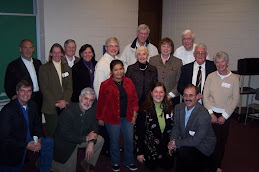The hidden exodus: Catholics becoming Protestants
Apr. 18, 2011
Any other institution that lost one-third of its members would want to know why
By Thomas Reese
The number of people who have left the Catholic church is huge.

We all have heard stories about why people leave. Parents share stories about their children. Academics talk about their students. Everyone has a friend who has left.
While personal experience can be helpful, social science research forces us to look beyond our circle of acquaintances to see what is going on in the whole church.
The U.S. Religious Landscape Survey by the Pew Research Center’s Forum on Religion & Public Life has put hard numbers on the anecdotal evidence: One out of every 10 Americans is an ex-Catholic. If they were a separate denomination, they would be the third-largest denomination in the United States, after Catholics and Baptists. One of three people who were raised Catholic no longer identifies as Catholic.
Any other institution that lost one-third of its members would want to know why. But the U.S. bishops have never devoted any time at their national meetings to discussing the exodus. Nor have they spent a dime trying to find out why it is happening.
Thankfully, although the U.S. bishops have not supported research on people who have left the church, the Pew Center has.
Pew’s data shows that those leaving the church are not homogenous. They can be divided into two major groups: those who become unaffiliated and those who become Protestant. Almost half of those leaving the church become unaffiliated and almost half become Protestant. Only about 10 percent of ex-Catholics join non-Christian religions. This article will focus on Catholics who have become Protestant. I am not saying that those who become unaffiliated are not important; I am leaving that discussion to another time.
Why do people leave the Catholic church to become Protestant? Liberal Catholics will tell you that Catholics are leaving because they disagree with the church’s teaching on birth control, women priests, divorce, the bishops’ interference in American politics, etc. Conservatives blame Vatican II, liberal priests and nuns, a permissive culture and the church’s social justice agenda.
One of the reasons there is such disagreement is that we tend to think that everyone leaves for the same reason our friends, relatives and acquaintances have left. We fail to recognize that different people leave for different reasons. People who leave to join Protestant churches do so for different reasons than those who become unaffiliated. People who become evangelicals are different from Catholics who become members of mainline churches.
Fr. Reese spends some time analyzing the data (For the full article go to http://ncronline.org/print/24022 ,) but his summation includes….
Lessons from the data
There are many lessons that we can learn from the Pew data, but I will focus on only three.
First, those who are leaving the church for Protestant churches are more interested in spiritual nourishment than doctrinal issues. Tinkering with the wording of the creed at Mass is not going to help. No one except the Vatican and the bishops cares whether Jesus is “one in being” with the Father or “consubstantial” with the Father. That the hierarchy thinks this is important shows how out of it they are.
While the hierarchy worries about literal translations of the Latin text, people are longing for liturgies that touch the heart and emotions. More creativity with the liturgy is needed, and that means more flexibility must be allowed. If you build it, they will come; if you do not, they will find it elsewhere. The changes that will go into effect this Advent will make matters worse, not better.
Second, thanks to Pope Pius XII, Catholic scripture scholars have had decades to produce the best thinking on scripture in the world. That Catholics are leaving to join evangelical churches because of the church teaching on the Bible is a disgrace. Too few homilists explain the scriptures to their people. Few Catholics read the Bible.
The church needs a massive Bible education program. The church needs to acknowledge that understanding the Bible is more important than memorizing the catechism. If we could get Catholics to read the Sunday scripture readings each week before they come to Mass, it would be revolutionary. If you do not read and pray the scriptures, you are not an adult Christian. Catholics who become evangelicals understand this.
Finally, the Pew data shows that two-thirds of Catholics who become Protestants do so before they reach the age of 24. The church must make a preferential option for teenagers and young adults or it will continue to bleed. Programs and liturgies that cater to their needs must take precedence over the complaints of fuddy-duddies and rubrical purists.
Current religious education programs and teen groups appear to have little effect on keeping these folks Catholic, according to the Pew data, although those who attend a Catholic high school do appear to stay at a higher rate. More research is needed to find out what works and what does not.
The Catholic church is hemorrhaging members. It needs to acknowledge this and do more to understand why. Only if we acknowledge the exodus and understand it will we be in a position to do something about it.








